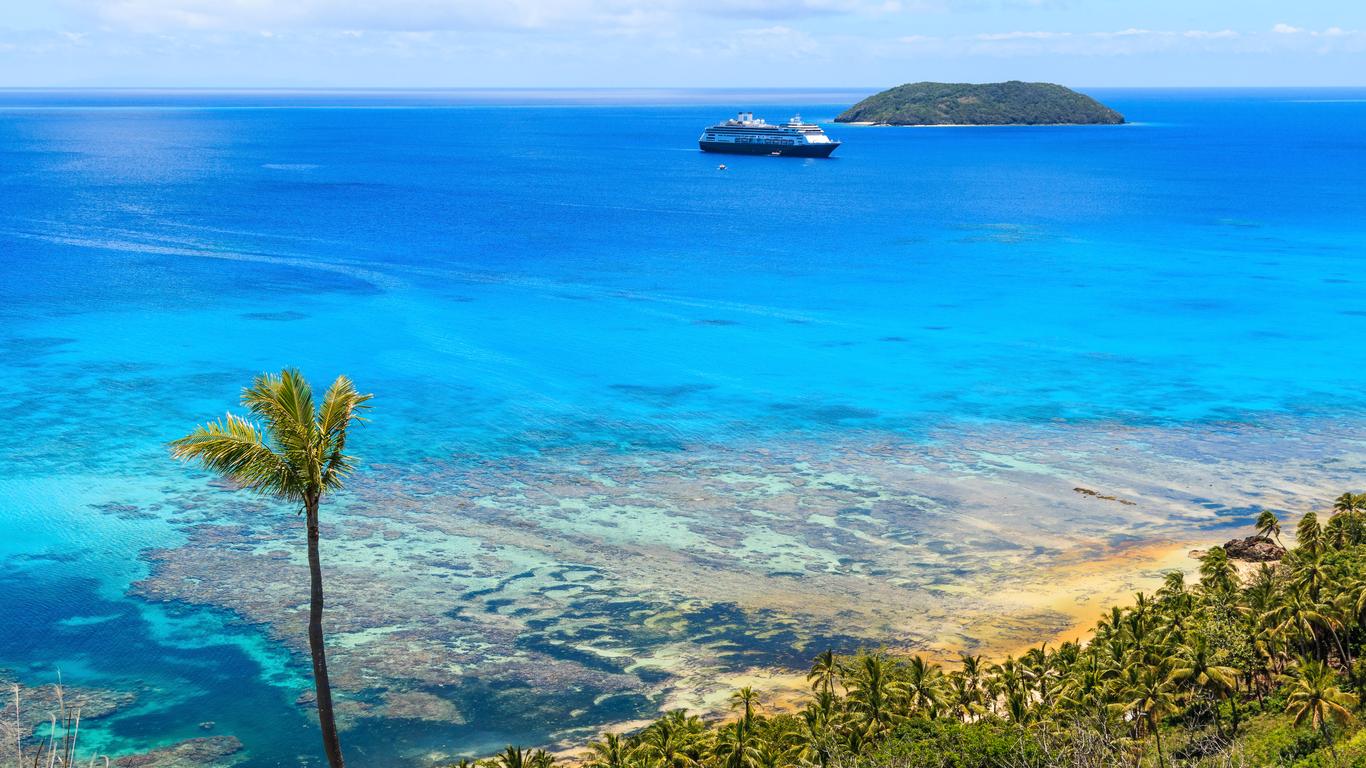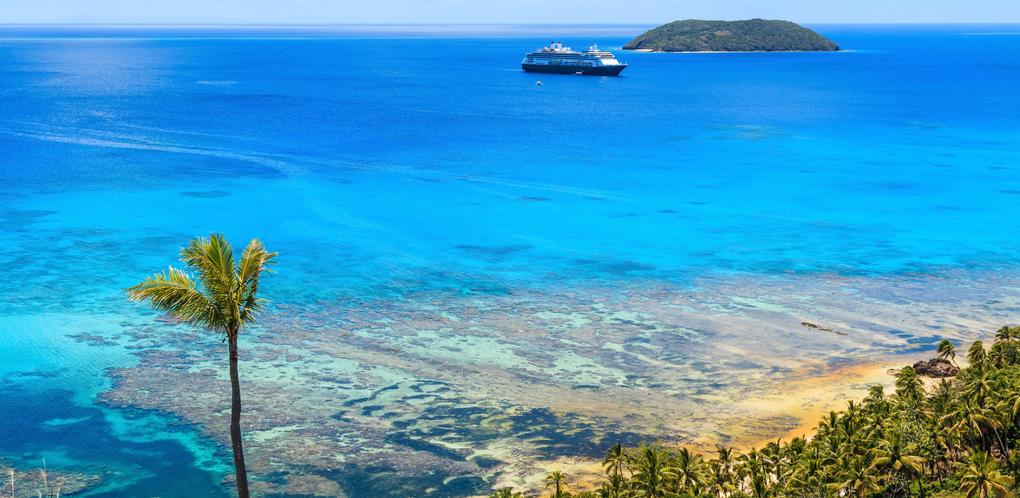
Suva travel guide
Suva Tourism | Suva Guide
You're Going to Love Suva
Suva, which can be found on Fiji's main island, Viti Levu, has the distinction of being the largest city in the South Pacific. It is rightly proud of its beautiful lush surroundings and lively cultural vibe, with downtown Suva presenting a pleasing mix of colonial architecture, quaint narrow streets, and modern shopping malls. Since it was designated the capital of Fiji in 1877, Suva has become the nation's political and commercial center as well as a popular tourist destination.

Suva came to prominence during the 19th-century reign of Chief Cakobau. Despite his military conquests, the chief was deep in debt by the late 1860s and in return for having his debts cleared, he leased Suva and the surrounding lands to Australia's Polynesia Company. The company cleared swampland in an unsuccessful attempt to grow cotton and sugar cane. Suva's real growth, however, came in the colonial period of the early 20th century when it received city status.
Suva has also played an important part in aviation history. In 1928, Charles Kingsford Smith was the first aviator to cross the Pacific in his Fokker trimotor. His epic journey started in California and ended in Australia, but the longest stretch was the 34-hour flight from Hawaii to Fiji. On arrival, the exhausted Kingsford Smith landed in Suva's Albert Park.
Top 5 Reasons to Visit Suva
1. It's a Rugby-loving Nation
The Fijians are fanatical about rugby, and no visit to Suva is complete without taking in the atmosphere of a game at Albert Park. During the April to September season, visitors can either catch a game of rugby union or watch the national team taking part in training sessions.
2. The Fijian Rainforest
Take just a short drive or bus journey from Suva and you'll find yourself deep in the country's lush rainforest. You can enjoy outdoor activities such as hiking to waterfalls or swimming in natural pools. If you feel more adventurous, visit a forest activity center.
3. Suva's Colonial Architecture
The best of Suva's colonial architecture can be found in its downtown district near the harbor. Stroll down Victoria Parade to see the old town hall, the Fintel building, and the Suva City Library, all built between 1904 and 1926. Also dating from this period is the beautiful Grand Pacific Hotel.
4. Birdwatching
Many of the birds you'll see in and around Suva are truly unique. The best place to capture them with your camera is at the Colo-i-Suva Rainforest Eco Resort just a short drive out of the city.
5. Church Music
The Fijians love to sing and on most nights of the week, you'll be able to hear the sound of glorious choirs coming from the numerous churches spread across Suva. Many places of worship such as the Sacred Heart Catholic Cathedral and the Shree Laxmi Narayan Temple have stunning interiors.
What to do in Suva
1. Visit Albert Park
Visit Albert Park to catch a game of rugby, and while there look out for the Kingsford Smith Pavilion, named in honor of this pioneering pilot's Pacific flight.
2. Explore the Fiji Museum
The Fiji Museum takes you on a historic and cultural journey back into the nation's past. Major attractions include the enormous Ratu Finau double-hulled canoe, the rudder from the ill-fated HMS Bounty, and gruesome displays covering Fiji's history of cannibalism.
3. Stroll through Thurston Gardens
The Fiji Museum is set in the tranquil surroundings of Thurston Gardens. The lush tropical vegetation provides a peaceful antidote to the realities of the museum's exhibits.
4. Soak Up the Vibe Around Pacific Harbor
Pacific Harbor, with its art village, is an enjoyable 45-minute drive or taxi journey along the coast from Suva. As well as browsing the art galleries and swimming in the Tiki pools, more energetic visitors can also play a round of golf or try their hand at scuba diving and snorkeling.
5. The Colo-i-Suva Forest Park
The Colo-i-Suva Park is a tropical rainforest oasis brimming with exotic and colorful birdlife. Stroll along the banks of the Waisila Creek or follow a hiking trail under the shaded canopy of forest trees.
1. Visit Albert Park
Visit Albert Park to catch a game of rugby, and while there look out for the Kingsford Smith Pavilion, named in honor of this pioneering pilot's Pacific flight.
2. Explore the Fiji Museum
The Fiji Museum takes you on a historic and cultural journey back into the nation's past. Major attractions include the enormous Ratu Finau double-hulled canoe, the rudder from the ill-fated HMS Bounty, and gruesome displays covering Fiji's history of cannibalism.
3. Stroll through Thurston Gardens
The Fiji Museum is set in the tranquil surroundings of Thurston Gardens. The lush tropical vegetation provides a peaceful antidote to the realities of the museum's exhibits.
4. Soak Up the Vibe Around Pacific Harbor
Pacific Harbor, with its art village, is an enjoyable 45-minute drive or taxi journey along the coast from Suva. As well as browsing the art galleries and swimming in the Tiki pools, more energetic visitors can also play a round of golf or try their hand at scuba diving and snorkeling.
5. The Colo-i-Suva Forest Park
The Colo-i-Suva Park is a tropical rainforest oasis brimming with exotic and colorful birdlife. Stroll along the banks of the Waisila Creek or follow a hiking trail under the shaded canopy of forest trees.
Where to Eat in Suva
Although relatively small in size, Suva offers a diverse and multicultural choice of eateries. Fijian and Indian dishes, along with a fusion of the two, are widely available as are recognizable Western fast-food names. For typical Fijian food, the Old Mill Cottage is a good choice, while for spicy Indian flavors visit the Curry House on Raojibhai Patel Street.
While in Suva be sure to try some traditional Lovo, where a variety of meat is wrapped in banana leaves along with coconut-marinated greens and root vegetables and then baked in an earth oven. Most local restaurants cost from F$10 to F$30 for mains although upmarket restaurants in hotels like the Grand Pacific or Tanoa Plaza will be pricier.
When to visit Suva
With its low annual rainfall and a temperature range that rarely drops below 74.2°F or exceeds 90.6°F, Suva is a pleasant year-round destination. You should, however, be prepared for high humidity. The hottest months are January to March. Suva's main annual event, the Hibiscus Festival, takes place in August and is a week-long celebration of fun, food, and street entertainment. Fire-walking is a typically Fijian ritual and can be seen at the South Indian Fire-Walking Festival held at the Mariamma Temple in July. Suva also celebrates the New Year in style with a week-long party of live music and fireworks.
How to Get to Suva
Plane
Nausori-Luvuluvu Airport is 45 minutes by car or taxi from Suva. Most flights are domestic but there are a few direct weekly flights from Auckland. A taxi from the airport costs around F$30.
Boat
Ferries from neighboring islands including Vanua Levu, Taveuni, and Ovalau dock at Walu Bay. Buses run from the ferry terminal to Suva bus station.
Car
To get the most out of your visit to Suva and the island of Viti Levu, arrange to collect a hire car on arrival at the airport. Prices for economy vehicles start at around F$500 a week.
Bus
There are daily air-conditioned bus services from Nadi. The journey takes approximately 3 hours and costs F$20.
Airlines serving Suva
Where to stay in Suva
Many of Suva's hotels date from the colonial period, a fact that is reflected in their architecture. The Five Princes Hotel set in tropical gardens is a local landmark and was home to Suva's first swimming pool, while the Grand Pacific Hotel has recently been restored to its former glory. At the other end of the budget are the dorm rooms of the Colonial Lodge. For upmarket luxury, look for hotels in the Central Business District or near the Parliament Building, while the streets around the Fiji Museum and Thurston Gardens offer an oasis of tranquility especially in the evenings.
Where to stay in popular areas of Suva
Most booked hotels in Suva
How to Get Around Suva
Public Transportation
Making use of the plentiful local buses is the best and most economical way to get around Suva, with short local journeys costing just 70 cents. No buses, however, run on Sundays. Routes join Suva to local resorts as well as to Pacific Harbor (costing F$4.40) and Colo-i-Suva.
Taxis
Taxis are also plentiful and affordable. Short city trips should cost from three to five Fijian dollars, while the journey to Colo-i-Suva costs F$15.
Car
With a car, visitors can meander along the Coral Coast, stopping off to sunbathe or dine at tropical beaches. In Suva itself, the main route through the city is a one-way street that loops around colonial buildings.
The Cost of Living in Suva
Shopping
There are four main shopping malls in the city, with the Morris Hedstrom City Center (MHCC) and Tappoo City Mall being the most popular. The MHCC is open seven days a week and has everything you could need under one roof, including a food court. For something a little different that's perfect for souvenir shopping, seek out Suva's little India, which can be found close to Cumming Street.
Supermarkets and Food Stores
While MHCC has food shops and supermarkets, it is much more fun shopping for food at the Suva Municipal Market. As well as familiar fruit and vegetables, look out for jackfruit, dalo, yams, and cassava. To admire the gaudy colors of Pacific fish, visit the Saturday morning fish market. A loaf of bread in a Suva supermarket costs around F$1.40 while apples are priced at around F$2.20.
